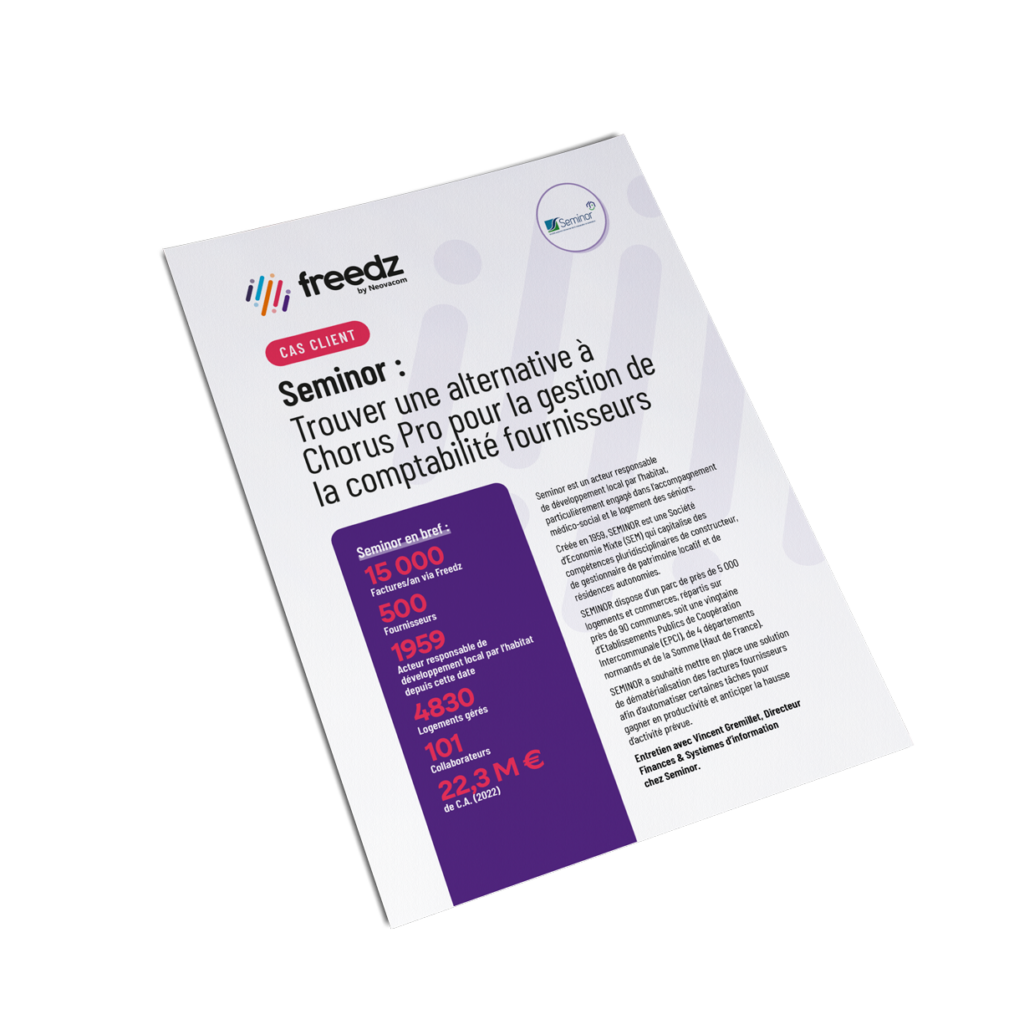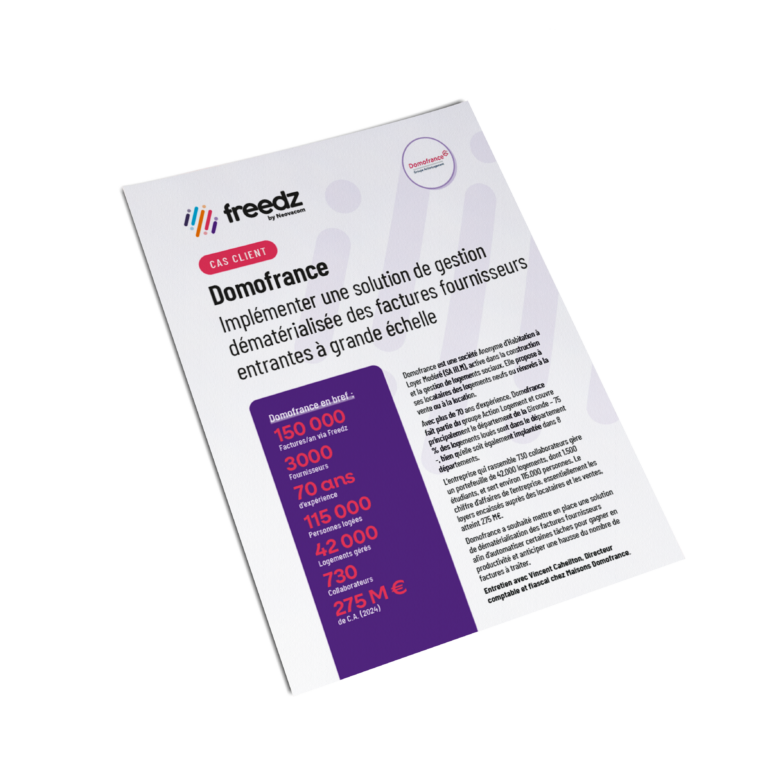Seminor
Find an alternative to Chorus Pro for supplier accounting management
Seminor is a responsible player in local development through housing, particularly committed to medico-social support and housing for seniors.
Created in 1959, Seminor is a semi-public company (SEM) that capitalizes on its multidisciplinary skills as a builder, manager of rental properties and independent living facilities.
Seminor has a portfolio of nearly 5,000 homes and businesses, spread over nearly 90 municipalities, i.e. some 20 Public Establishments of Intercommunal Cooperation (EPCI), in 4 departments of Normandy and the Somme (Haut de France).
Seminor wanted to implement a solution for the dematerialization of supplier invoices in order to automate certain tasks to gain in productivity and anticipate the expected increase in activity.
Interview with Vincent Gremillet, Director of Finance & Information Systems at Seminor.
Why did you set up this project?
Coming from an OPH (Office Public de l'Habitat) and having used Chorus in the past, I found the Chorus platform efficient and I wanted to integrate a similar system for our Mixed Economy Company (SEM).
First, I exchanged with Neovacom concerning another subject, the management of exchanges with the CAF. At the same time, I was introduced to the Freedz platform and I was seduced by the proposed solution which also met our needs for dematerializing supplier invoices.
Having been a Chorus user in the past, I could totally relate to what the Freedz platform offered and how it worked.
What drove you to take the step?
When I arrived at SEMINOR, everything was done manually. The invoices were scanned and then integrated into our network with a video link that looked like a DMS. This link appeared in the information system and allowed to consult the invoice.
Previously, paper invoices were lost between departments, emails were sent to the wrong people, which led to additional handling to send the invoice to the right person, have it validated and then processed.
I wanted to automate some of the processes and that's why we took the step.
Today, more than 50% of the invoices arrive directly on Freedz and 30% arrive by email and are transferred and integrated into the Cloud platform. In total, 80% of invoices no longer need to be scanned.
In addition, there is an internal desire to develop the activity, which is reflected in a 4% increase in housing delivered this year, as well as more than 200 housing units/year to be rehabilitated.
How was the project set up?
There was an initial phase of comparison of existing solutions and when I chose Freedz, we had to propose this solution internally. Initially, the project in progress concerned the deployment of an EDM that was close to a LAD / RAD system.
I had a feeling that it would be complex to set up and that the LAD / RAD system would quickly become obsolete. I convinced the teams internally and we found Freedz innovative in reproducing what works for the public but for the private sector.
The implementation of the project went well. We deployed several tools to allow us to easily integrate invoices from Freedz into our Information System (using the Chorus module).
The objective was to upload the invoices with the information they contain and then to have them follow our validation workflow so that they are sent to the right person (generally the one who placed the order thanks to the commitment number).
At the same time, we have set up in-house training to support the change from processing a paper invoice to an electronic invoice (invoice validation, processing, etc.).
There was also an "education" phase with our suppliers. This transition was made possible thanks to the support of our Customer Success Manager at Freedz who followed us throughout the project. The support provided to suppliers, the communication tools made available, the regular follow-up meetings with new topics to be discussed enabled us to keep up the pace of the project deployment and contributed to the success of this project.
What benefits do you see from using Freedz?
The first benefit we saw was the time and productivity savings made possible by automation. Making time-consuming tasks automatable allowed us to focus on higher value-added tasks.
Another perceived benefit is the fact that despite an increase in activity, we don't need to recruit an additional internal person. On the contrary, and despite the time required to set up the project, we have even gained the equivalent of ½ FTE since we started using the Freedz solution.
How did your suppliers adapt?
Thanks to the support of our CSM, we quickly managed to convince our suppliers. They quickly felt the benefits of Freedz for them and their business thanks to the invoice tracking.
They can now view the status of their invoice live and no longer worry about whether the invoice was sent, received and addressed to the right person.
We still have to convince some large suppliers, but that will come through the renewal of contracts but also through the entry into force of the Finance 2020 law and the obligation of electronic invoicing.
What are your goals for the coming years?
One of the objectives is the implementation of the Freedz work situation module which will allow us to dematerialize exchanges and improve processing times.
We also want to strengthen our communication with suppliers to help them use Freedz. With the gradual obligation to switch to electronic invoicing, we want to anticipate the deadline and get them used to the system right away.
Our goal is to dematerialize more than 90% of our supplier invoices by 2023 while increasing our activity through construction and rehabilitation.

Télécharger ce cas client en PDF
How Freedz helps its customers' management
From administration and finance to IT and real estate, our customers tell us why they chose Freedz.
RATP Habitat – Gérer la facturation entrante avec un point d’entrée unique et supprimer le format papier
Logeo Seine – Répondre à un fort accroissement du volume entrant de factures et être prêt pour la réforme
